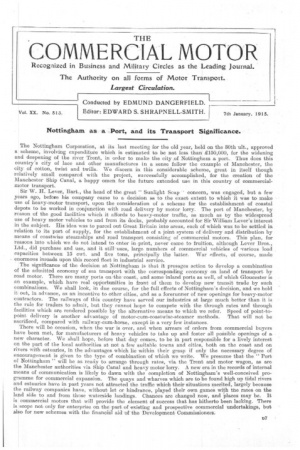COMMERCIAL MOTOR
Page 1

If you've noticed an error in this article please click here to report it so we can fix it.
Recogrtized in Business and Military Circles as the Leading Journal.
The Authority on all forms of Motor Transport. Largest Circulation.
Conducted by EDMUND DANGERFIELD.
Vol. XX. No. 513. Editor: EDWARD S. SHRAPNELL-SMITH. 7th January, 1915.
Nottingham as a Port, and its Transport Significance.
The Nottingham Corporation, at its last meeting for the old year, held on the 30th ult., approved a scheme, involving expenditure which is estimated to be not less than £150,000, for the widening and deepening of the river Trent, in order to make the city of Nottingham .a port.. Thus does this country's city of lace and other manufactures in a sense follow the example of Manchester, the city of cotton, twist and twills. We discern in this considerable scheme, great in itself though relatively small compared with the project, successfully accomplished, for the creation of the Manchester Ship Canal, a happy omen for the future extended use in this country of commercialmotor transport.
Sir W. H. Lever, Bart., the head of the great " Sunlight Soap concern, was engaged, but a few years ago, before. his company came to a decision as to the exact extent to which it was to make use of heavy-motor transport, upon the consideration of a scheme for the establishment of coastal depots to be worked in conjunction with road delivery by motor lorry. The port of Manchester, by reason of the good facilities which it affords to heavy-motor traffic, as much as by the widespread use of heavy motor vehicles to and from its docks, probably accounted for Sir William Lever's interest in the subject. His idea was to parcel out Great Britain into areas, each of which was to be settled in relation to its port of supply, for the establishment of a joint system of delivery and distribution by means of coastwise steamships and road transport consisting a commercial motors. This plan, for reasons into which we do not intend to enter in,print, never canie to fruition, although Lever Bros., Ltd., did purchase and use, and it still-uses, large numbers of commercial vehicles of -various load capacities between 15 cwt. and five tons, principally the latter. War effects, of course, made enormous inroads upon this record fleet in industrial service.
The significance of the decision at Nottingham is that it presages action to develop a combination of the admitted economy of sea transport with the corresponding economy on land of transport by road motor. There are many ports on,the -coast, and some inland ports as well, of which Gloucester is an example, whieh have real opportunities in front of them to develop new transit trade by such combinations. We shall look, in due course, for the full effects of Nottingham's decision, and we hold it out, in advance, as an incentive to other cities, and as a forerunner of new openings for heavy-motor contractors. The railways of this country have served our industries at large much better than it is the rule for traders to admit, but they cannot hope to compete with the through rates and through facilities which are rendered possible by the alternative means to which we refer. Speed of point-topoint delivery is another advantage of motor-cum-coastwise-steamer methods. That will not be sacrificed, compared with railway-cum-horse, except in a very few instances. There will be occasion, when the war is over, and when arrears of orders from commercial buyers have been met, for manufacturers of heavy vehicles to take up and foster all possible openings of a new character. We shall hope, before that day comes, to be in part responsible for a lively interest on the part of the local authorities at not a few suitable towns and cities, both on the coast and on rivers with estuaries, in the advantages which lie within their grasp if only the necessary degree of encouragement is given to the type of combination of which we write. We presume that the " Port of Nottingham" will be as ready to arrange through rates, via the Trent and motor wagon, as are the Manchester authorities via Ship Canal and heavy motor lorry. A new era in the records of internal means of communication is likely to dawn with the completion of Nottingham's well-conceived programme for commercial expansion. The quays and wharves which are to be found high up tidal rivers and estuaries have in past years not attracted the traffic which their situations merited, largely because the railway companies have, without let or hindrance, played their own games with the rates on the land side to and from those waterside landings. Chances are changed now, and places may be. It is commercial motors that will provide the element of success that has hitherto been lacking. There is scope not only for enterprise on the.part.of existing ani prospective commercial undertakings, but also for new schemes with the financial aid -of-the Development Commissioners:


















